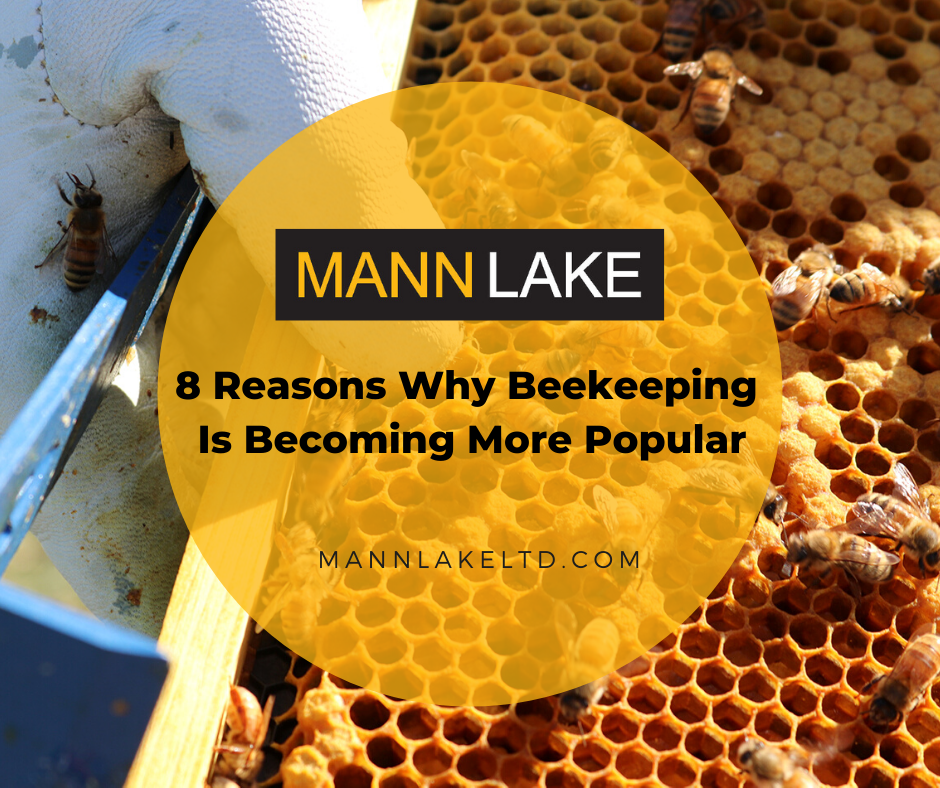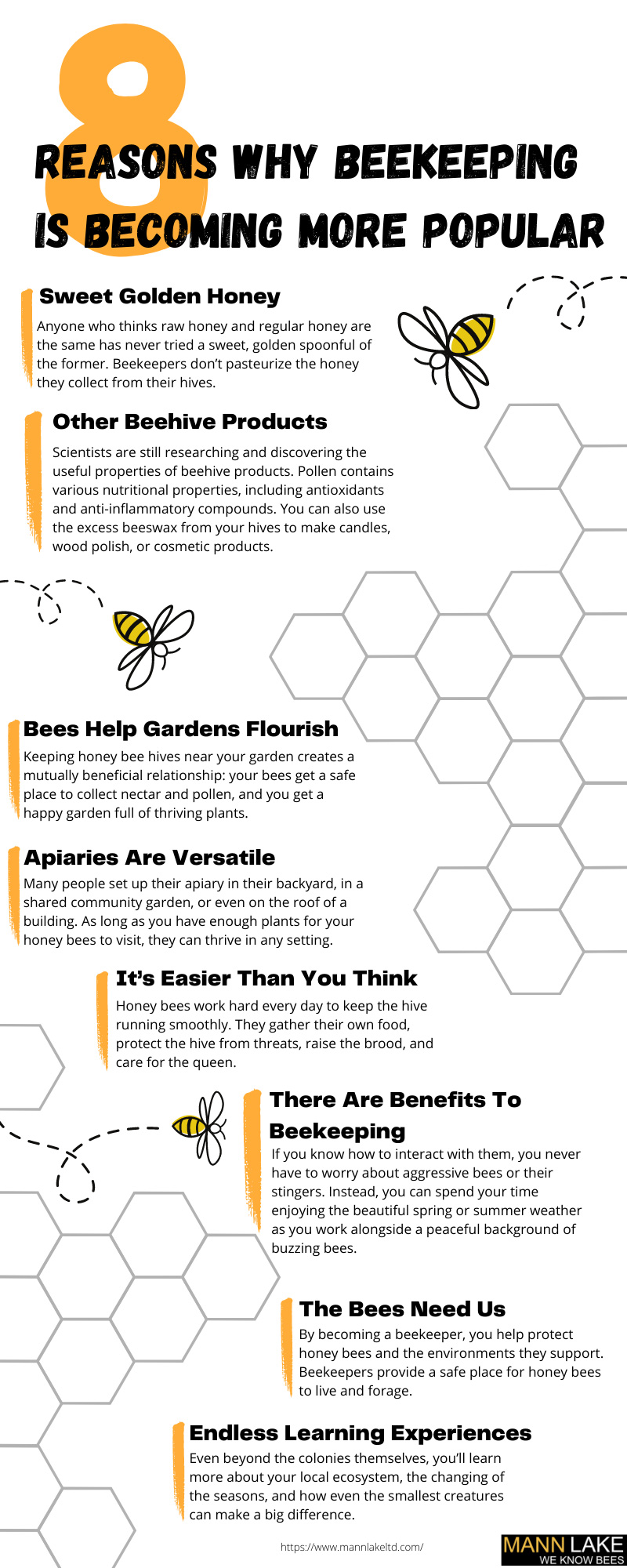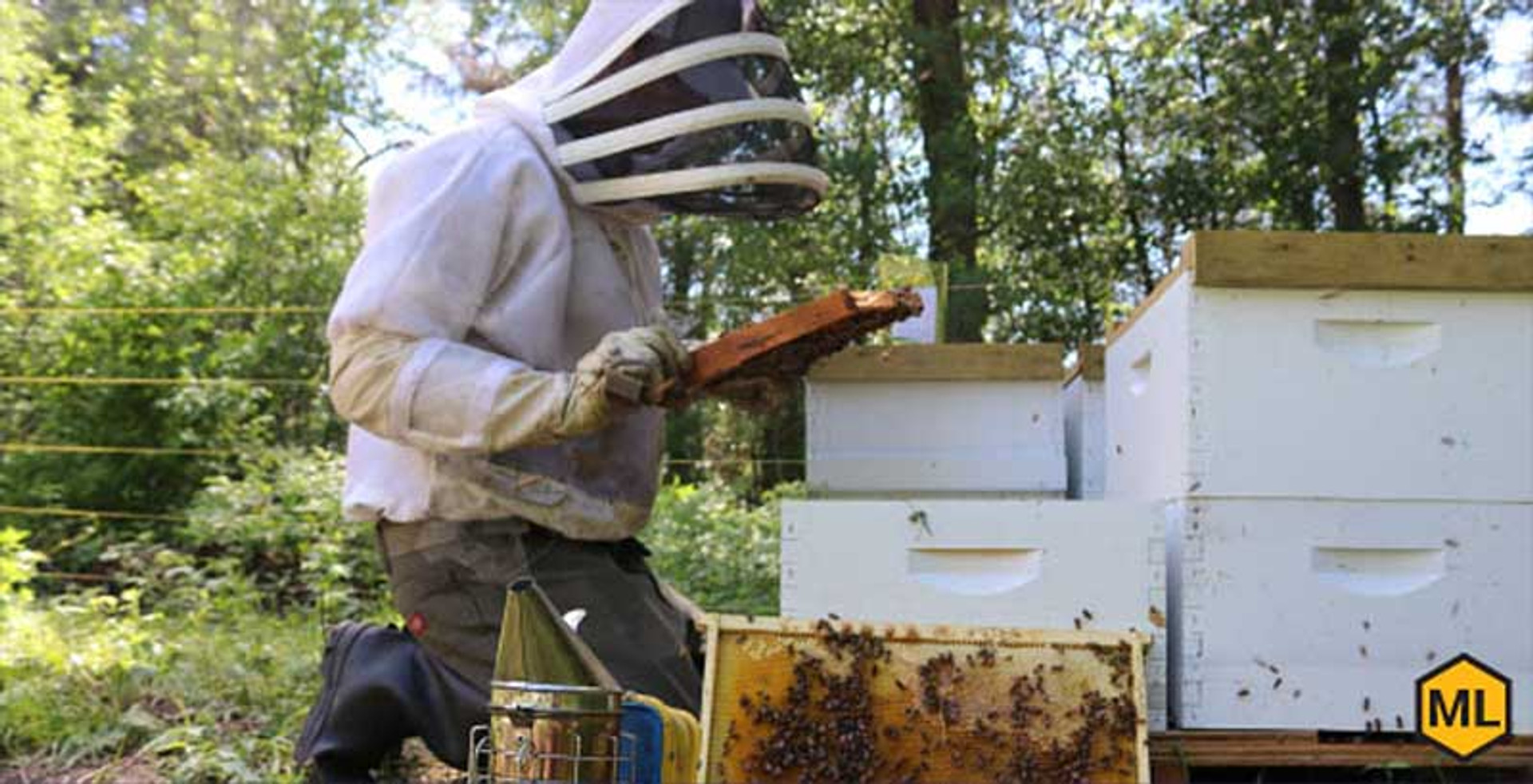8 Reasons Why Beekeeping Is Becoming More Popular
.What’s all the buzz about beekeeping? These days, you can find a thriving apiary anywhere you go: on farms, in suburban gardens, and even on city rooftops. Of course, humans have kept bees for thousands of years, but why is this hobby suddenly growing in popularity?
Part of it is the rising demand for sustainable, organic, and ethically-made foods like raw honey. However, much of beekeeping’s growing popularity stems from the fact that it’s a fun, interesting, and potentially lucrative hobby.
Every beekeeper has their own reason for stepping into the bee suit. What will yours be? Explore some of the reasons why beekeeping is becoming more popular with this list.

Sweet Golden Honey
You don’t have to be a beekeeper to know that honey is the main appeal of beekeeping. You shouldn’t keep honey bees unless you want to eat (or sell) the delicious and nutritious honey they produce. Anyone who thinks raw honey and regular honey are the same has never tried a sweet, golden spoonful of the former. Beekeepers don’t pasteurize the honey they collect from their hives.
It moves from comb to bottle after a simple filtration process. This means raw honey keeps all of its natural flavor and nutritional benefits. Consumers are eager to buy raw honey because it’s a natural sweetener, can ease seasonal allergies, and has antibacterial properties. Of course, you’ll need an effective business plan if you want to sell your honey crop. The product is so popular, though, that finding a local market won’t be difficult.
Other Beehive Products
Honey isn’t the only beehive product you can gather, use, and sell. Scientists are still researching and discovering the useful properties of beehive products. Pollen contains various nutritional properties, including antioxidants and anti-inflammatory compounds.
You can also use the excess beeswax from your hives to make candles, wood polish, or cosmetic products. Propolis—the glue-like substance honey bees use to build and repair their hive—is another popular material. You can use propolis as an anti-inflammatory agent. It also works as a salve for minor wounds or cold sores. If you don’t want to sell these products yourself, you can try partnering with local businesses and other organizations that will buy the products from you.
Bees Help Gardens Flourish
Honey bees are vital pollinators. When they visit flowers in search of nectar, they collect and spread pollen. This means that any flowering plants within your honey bees’ foraging range will thrive under their expert pollination skills.
Keeping honey bee hives near your garden creates a mutually beneficial relationship: your bees get a safe place to collect nectar and pollen, and you get a happy garden full of thriving plants. A honey bee foraging range can extend up to five miles, so any other flowers and gardens in the neighborhood will reap the benefits, too.
However, you must make sure your local gardens are a safe place for your honey bees. Provide clean, shallow water dishes for the honey bees to stop for a refreshing drink. Most importantly, don’t use pesticides or other chemicals to protect your plants, as these are toxic to honey bees and other pollinators.
Apiaries Are Versatile
When you keep honey bees, you need a hive with a bottom board, a deep hive body for the queen and her brood, a honey super, and a top cover. Other than that, your honey bees will be happy anywhere. You don’t need a farm or even a massive yard to be a successful beekeeper.
Many people set up their apiary in their backyard, in a shared community garden, or even on the roof of a building. As long as you have enough plants for your honey bees to visit, they can thrive in any setting.
It's Easier Than You Think
Honey bees are relatively independent creatures. Once you set up a hive, purchase your equipment, and install your new honey bee colony, they take over most of the legwork. Honey bees work hard every day to keep the hive running smoothly.
They gather their own food, protect the hive from threats, raise the brood, and care for the queen. Your primary duties include performing a hive inspection every seven to ten days, guarding the hive against pests and predators, and harvesting honey responsibly at the end of the season. While beekeeping takes work and commitment, the self-sufficiency of honey bees makes the job easier.
There Are Benefits To Beekeeping
Honey isn’t the only benefit to beekeeping. Beekeepers get to spend more time outside. The activity, fresh air, and peaceful time spent in nature can benefit your physical and emotional well-being. Plus, working with honey bees is downright relaxing for many people. Honey bees are fascinating and curious creatures. If you know how to interact with them, you never have to worry about aggressive bees or their stingers. Instead, you can spend your time enjoying the beautiful spring or summer weather as you work alongside a peaceful background of buzzing bees.
The Bees Need Us
Bee populations are declining due to climate change and modern commercial farming techniques. We rely on honey bees and other pollinators to help our crops thrive, support our ecosystems, and make the world a more beautiful place.
There are many reasons why beekeeping is becoming more popular, but this is by far the noblest: by becoming a beekeeper, you help protect honey bees and the environments they support. Beekeepers provide a safe place for honey bees to live and forage. They also promote awareness about honey bees and fight misconceptions about these valuable creatures.
Endless Learning Experiences
How much do you know about honey bees? When you become a beekeeper, every day is full of wonderful new experiences. How do honey bees make honey? How do they communicate with each other? What does the inside of a hive look like? Beekeepers learn the answer to these questions firsthand as they step into the fascinating lives of their honey bees. Even beyond the colonies themselves, you’ll learn more about your local ecosystem, the changing of the seasons, and how even the smallest creatures can make a big difference.
Have we convinced you to don a beekeeping suit and pursue this rewarding hobby? You can find everything you need to start beekeeping with Mann Lake’s beekeeping kits. Gather your equipment, find the perfect spot, and join a community of passionate beekeepers today!


